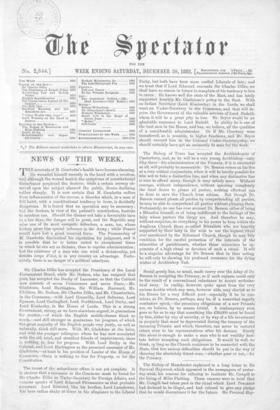Sir Charles Dilke has accepted the Presidency of the Local
Government Board, while Mr. Dodson, who has resigned that post, has accepted the Duchy of Lancaster, so that the Cabinet now consists of seven Commoners and seven Peers,—Mr. Gladstone, Lord Hartington, Sir William Harcourt, Mr. Childers, Mr. Dodson, Sir Charles Dilke, and Mr. Chamberlain, in the Commons,—with Lord Granville, Lord Selborne, Lord Spencer, Lord Carlingford, Lord Northbrook, Lord Derby, and Lord Kimberley, in the House of Lords. This is a strong Government, strong, as we have elsewhere argued, in guarantees for caution,—of which the English middle-classes think so much,—and still stronger in guarantees for 'Progress, of which the great majority of the English people very justly, as well as naturally, think still more. With Mr. Gladstone at the helm, and with the younger colleagues whom he has now associated with the old, tried, and steadfast friends of improvement, there is nothing to fear for progress. With Lord Derby in the Cabinet, and Lord Hartington as the promised successor of Mr. Gladstone,—at least in his position of Leader of the House of Commons,—there is nothing to fear for Property, or for the Constitution.


































